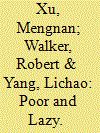| Srl | Item |
| 1 |
ID:
186727


|
|
|
|
|
| Summary/Abstract |
Now addressing relative not absolute poverty, China must redistribute income from the middle class to persons experiencing poverty. However, policy rhetoric has recently prioritised laziness as causing poverty, a view widely shared by China’s middle class. Employing a convenience sample of 2,449 middle-class respondents, regressions relate the attribution of poverty to personality, and ideological and individual socialisation. Given two choices, most respondents chose laziness over unfairness but, with more choice, selected ‘modern progress’. Respondents prioritising laziness exhibited extravert and authoritarian personality traits and more faith than others in government policies. They were less well educated and unlikely to have studied social sciences. Respondents subsequently attributing poverty to modern progress had similar characteristics but were not extravert. Building support for redistributive policies could therefore prove difficult.
|
|
|
|
|
|
|
|
|
|
|
|
|
|
|
|
| 2 |
ID:
175560


|
|
|
|
|
| Summary/Abstract |
While it is increasingly recognized that shame is a pernicious component of the experience of poverty, the stigma generally associated with social assistance provision is less marked with respect to China's Minimum Living Security System, also known as dibao. This enigma is explored and illuminated drawing on two streams of indigenous Chinese scholarship and qualitative fieldwork in eight villages in Shanxi province. Economic and political changes prioritizing economic growth and individual wealth have increased the shame associated with poverty, manifest as loss of face, low mian (status) and lack of lian (integrity). However, this shame does not transfer to dibao because the scheme has been transformed locally into a universal age supplement that partially fulfils the demands of filial piety and which is seen to reflect and contribute to guanxi (social influence).
|
|
|
|
|
|
|
|
|
|
|
|
|
|
|
|